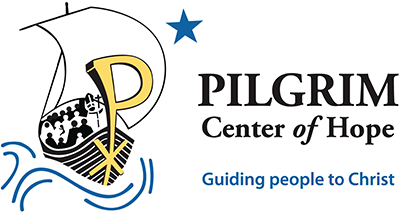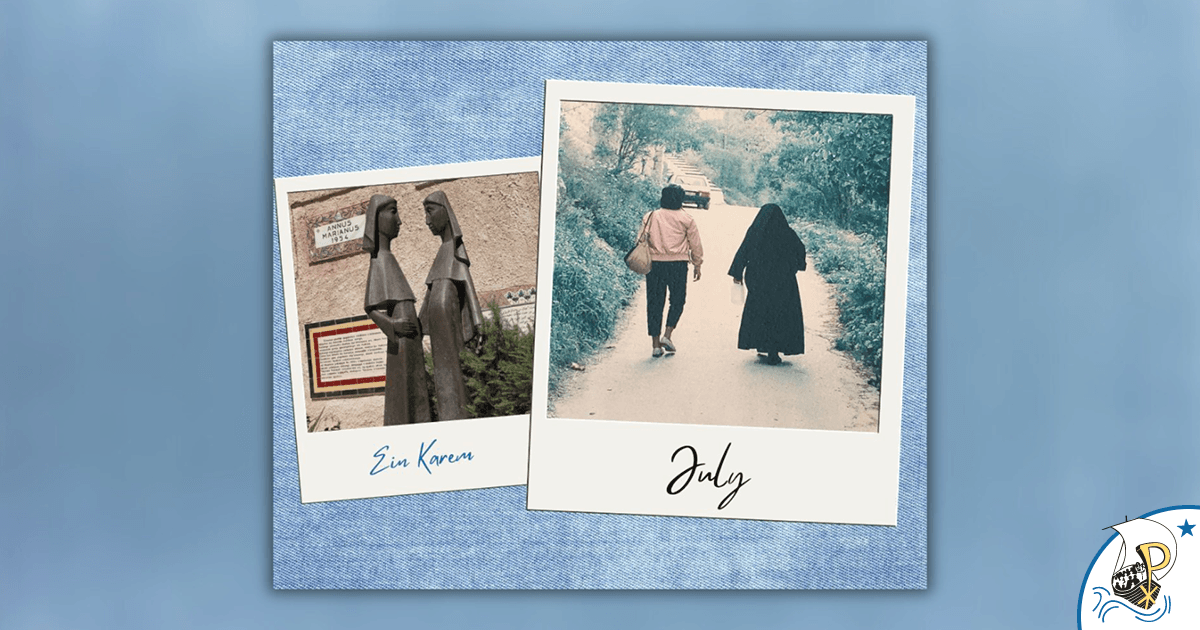This month, Deacon Tom and Mary Jane Fox share the fruits they received from their first pilgrimage to the Holy Land, and we join them for a special, return visit.
1984-1986
Mary Jane: We returned on fire in our Catholic faith determined not to let it go out. To do so, we knew we had to remain close to Christ, so daily Mass became our routine. Though our lives resumed as busy as before, we actively sought out ways to know and serve God. We greatly desired to share God’s works of hope we experienced. Tom and I paid a visit to our pastor and told him we wanted to get more involved at the parish. He recommended we join a prayer group and told us to jump into parish life. He encouraged us to see where we would like to serve and do it. Our lives revolved around work, family, and parish life. In the Fall of 1984, Tom joined the diaconate program.
Deacon Tom: Mary Jane and I attended the Diaconate classes together which caused us both to grow deeper into our faith. Through the formation we were receiving and praying the Liturgy of the Hours daily; we were brought to a deeper awareness of the presence of God in our lives and the importance of surrendering our plans according to God’s Will. We were also very optimistic that we would soon be parents. With Mary Jane healed, our hope was that we would be able to have children.
Mary Jane: In 1986, two years after our first visit and still working as a travel agent, I earned a second incentive trip. I went home with the news hoping Tom would want to return to the Holy Land. When I told Tom, he responds without hesitation, “Let’s go back to Jerusalem.”
We had continued our friendship long-distance with Sr. Bernarda. Our first correspondence with her included the funny story that when we returned home from the first visit and were going through our mail, we discovered a letter from Casa Nova informing us they would not be able to accommodate us. (In fact, this was exactly where we had ended up staying!) Sr. Bernarda told us she shared that story with her staff and everyone laughed and praised God. We wrote Sr. Bernarda again, letting her know we would soon see her.
Deacon Tom: Returning to Casa Nova is like coming home. As soon as we walk in, the last two years apart melt away. Ihab, now a young man, greets us with a big smile. Sr. Bernarda embraces us both and covers us with kisses. The other sisters come and welcome us back. Our hearts swell as we are filled with the warm hospitality that is the fruit of these lives offered to God in service of his pilgrims.
“You must be hungry,” Sr. Bernarda says, and leads us into the dining room. She sits us with others who will become our pilgrim family for the next two weeks. We enjoyed our first night filled with hours of laughter, food, and shared stories. At the end of the evening, Sr. Bernarda pulls us aside and asks, “And what about children?”
Mary Jane: I shake my head and do my best to hold back tears as Tom and I share our continued failure to get pregnant. Sr. Bernarda takes our hands in hers, smiles and says, “I know what we must do. Tomorrow, we will visit Elizabeth’s house and bless you with the water from her well.” All we can do is smile; not only at her deep care for us, but at the way she speaks of Mary’s cousin in the present tense. Sr. Bernarda reminds us of a treasure taught by our Catholic faith; the communion of saints and the assurance of their heavenly intercession in our earthly lives. Yes! We will go visit Elizabeth’s home and bless ourselves at her well where, pregnant with John the Baptist, she welcomed the mother of our Lord.
Deacon Tom: The following day, the three of us walk to Ein Karem (Hebrew for Spring of the Vineyard) where Mary, fresh from the Annunciation, traveled in haste to visit her cousin Elizabeth. As we ascend the steep hill, I watch Mary Jane and Sr. Bernarda ahead of me. They are walking closely together, deep in conversation. I imagine Mary and Elizabeth doing the same. I picture these two women touched by God’s miracles, praying, laughing, and wondering together what the future holds.
Mary Jane: We find the well, but it is covered and locked. “This is odd,” said Sr. Bernarda. “I have never seen it covered before.” She suggests we instead go into the Church of the Visitation and ask Mary and Elizabeth to pray for us. We kneel in the presence of Jesus in the tabernacle and together pray for their intercession in asking God to bless us with children. Afterwards, we walk around the church courtyard. On the walls, mosaics with Mary’s Magnificat written in several languages are displayed. We find the English translation, and praise God in Mary’s words. The peace we both feel assures us that God has heard our prayer.
Deacon Tom: Looking back on it all now, we wonder if the locked well was God’s answer to our prayer for children. If it was, our hearts were not prepared at the time to hear it.
Mary Jane and I walked back praying, laughing, and wondering together what the future holds.

Our trust in God’s Providence does not mean we will not have sorrow, but it does mean we can live in hope during our suffering.
“You, O Lord, are my hope” (Ps 71:5). These words well up from a heart burdened by grave hardship: “You have made me see many troubles and calamities” (v. 20), the Psalmist exclaims. At the same time, his heart remains open and confident; steadfast in faith, he acknowledges the support of God, whom he calls “a rock of refuge, a strong fortress” (v. 3). Hence, his abiding trust that hope in God never disappoints: “In you, Lord, I take refuge; I shall never be put to shame” (v. 1).
Amid life’s trials, our hope is inspired by the firm and reassuring certainty of God’s love, poured into our hearts by the Holy Spirit. That hope does not disappoint (cf. Rom 5:5). Thus Saint Paul could write to Timothy: “To this end we toil and struggle, because we have our hope set on the living God” (1 Tim 4:10). The living God is in fact “the God of hope” (Rom 15:13), and Christ, by his death and resurrection, has himself become “our hope” (1 Tim 1:1). We must never forget that we were saved in this hope, and need to remain firmly rooted therein.

